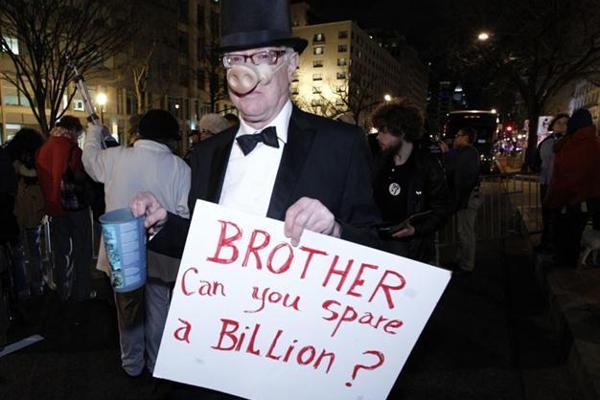Police to enforce no camping rules at Occupy DC sites
WASHINGTON - Agence France-Presse


Occupy DC demonstrators protest as they try to block the guest entrance to the Alfalfa Dinner at the Capitol Hilton in Washington on Saturday, Jan. 28, 2012. AP photo
Anti-corporate Occupy DC demonstrators in Washington face a deadline Monday to end their four months of camping or risk arrest -- but are confident their protest sites will not be closed down.In a sign of tensions, police stunned a protester with a taser Sunday for tearing down flyers announcing the deadline, and arrested him for disorderly conduct at McPherson Square, one of two Occupy protest sites in the US capital.
Occupy DC is the most visible remaining offshoot of the Occupy movement after New York police swept away the original Wall Street encampment in mid-November.
The deadline comes after riot police arrested more than 400 anti-Wall Street protesters amid clouds of tear gas overnight Saturday to Sunday in Oakland, California.
Starting noon Monday, the US Park Police, which manages the Washington sites, will begin enforcing a ban on camping at McPherson Square and Freedom Plaza -- each a sea of tents and blue tarps for several weeks now, and each located about a five-minute walk from the White House.
"If camping violations are observed, individual violators may be subject to arrest and their property subject to seizure as evidence," read a flyer police handed out to protesters.
"Any temporary structure used for camping also will be subject to seizure as an abatement of a public nuisance." The rules however give the activists room to continue protesting, as long as they leave "one side of all temporary structures open at all times" for health and safety purposes, and to let Park personnel "monitor compliance with camping regulations," the flyer read.
Camping is defined "as sleeping or preparing to sleep at the site," said National Park Service Director Jonathan Jarvis, testifying on Capitol Hill on January 24.
Jarvis said that temporary structures "including tents are permissible as a part of a demonstration and a 24-hour round-the-clock vigil." For this type of protest activists "are awake at all times providing information" about their activities, he said.
Under Park Service rules no permit is needed for groups of fewer than 500 to gather in the park.
Activists believe the new rules only mean a change of tactics.
"There is no expectation that the site is coming down," said activist Annie Storr at the McPherson Square site.
The tents will now be used for "open public use," not camping, and there will be no more sleeping bags or camping gear. "It is a paradigm shift," she said.
The McPherson Square activists vowed late Sunday to resist any move to evict them.
"We have a dream of a better world. Let us sleep so we have the energy to create it," they said in a statement.
"Both sleeping members and non-sleeping" Occupy DC members will "defend the public space we have used as our center for activism." Occupy DC members "will peacefully resist this politically motivated attempt to suppress the free speech of the disenfranchised 99 percent," the statement read.
Protests against inequality and corporate influence on US politics began last September in New York and quickly spread around the country. Most of the demonstrations were shut down by the end of the year.
On Saturday, some 200 Occupy DC protesters stripped down for a topless street party outside a black-tie gala for Washington's biggest movers and shakers, whose invited guests included President Barack Obama and his wife Michelle.
Leading the revelers were several young women who bared their breasts, and several men stripped to the waist despite the winter chill.
